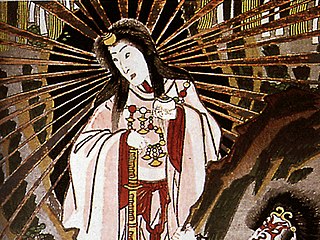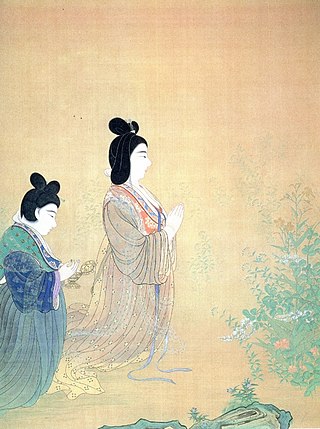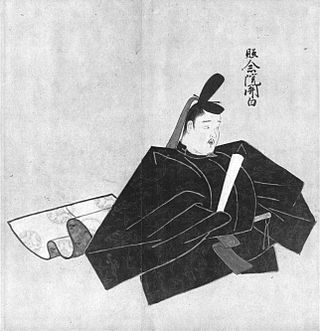Related Research Articles
Lady Nijō was a Japanese noblewoman, poet and author. She was a concubine of Emperor Go-Fukakusa from 1271 to 1283, and later became a Buddhist nun. After years of travelling, around 1304–07 she wrote a memoir, Towazugatari, the work for which she is known today, and which is also the only substantial source of information on her life.

Fujiwara no Shunzei was a Japanese poet, courtier, and Buddhist monk of the late Heian period. He was also known as Fujiwara no Toshinari or Shakua (釈阿) and when younger (1123–67) as Akihiro (顕広). He was noted for his innovations in the waka poetic form and compiling the Senzai Wakashū, the seventh imperial anthology of waka poetry.

In Japanese mythology, Takamagahara, also read as Takaamanohara, Takamanohara, Takaamagahara, or Takaamahara, is the abode of the heavenly gods (amatsukami). Often depicted as located up in the sky, it is believed to be connected to the Earth by the bridge Ame-no-ukihashi.

The Yōrō Code was one iteration of several codes or governing rules compiled in early Nara period in Classical Japan. It was compiled in 718, the second year of the Yōrō regnal era by Fujiwara no Fuhito et al., but not promulgated until 757 under the regime of Fujiwara no Nakamaro under Empress Kōken.

Empress Kōmyō (光明皇后), born Fujiwara Asukabehime, was the consort of Japanese Emperor Shōmu (701–756) during the Nara Period.

Takatsukasa Kanehira, fourth son of Konoe Iezane, was a court noble (kugyo) and regent of the Kamakura period of Japan, and founding father of the Takatsukasa family. His sons include Kanetada and Mototada.
Fabio Rambelli is an Italian academic, author and editor. He is a professor in the Department of Religious Studies at the University of California, Santa Barbara (UCSB).
Fujiwara no Kiyoko, later Kōkamon'in (皇嘉門院), was an Empress consort of Japan as the consort of Emperor Sutoku.
Bernard Faure is a Franco-American author and scholar of Asian religions, who focuses on Chan/Zen and Japanese esoteric Buddhism. His work draws on cultural theory, anthropology, and gender studies. He is currently a Kao Professor of Japanese Religion at Columbia University and an Emeritus Professor of Religious Studies at Stanford University. He also previously taught at Cornell University, and has been a visiting a professor at the University of Tokyo, the University of Sydney, and the École Pratique des Hautes Études in Paris. He co-founded the Center for Buddhist Studies at Stanford University and the ARC: Asian Religions and Cultures Series within Stanford University Press. He is also the founder and co-director of the Columbia Center for Buddhism and East Asian Religions (C-BEAR). His work has been translated into several Asian and European languages.
Christina Laffin is an Associate Professor in the Department of Asian Studies at the University of British Columbia. She is also a Canada Research Chair in premodern Japanese literature and culture, and co-director at the Centre for Japanese Research. Her research interests include medieval travel diaries; women's education and socialization before 1600; poetic practices and waka culture; theories of travel, gender, and autobiography; noh theatre; and comparative approaches to medieval literature.
Steven Robert Reed is a political scientist and Professor of Modern Government in the Faculty of Policy Studies at Chuo University in Tokyo. He has held positions at the University of Alabama and Harvard University, and he has served as a visiting professor at Stanford University, University of Washington, and Chiba University.
Screening Enlightenment: Hollywood and the Cultural Reconstruction of Defeated Japan is a 2010 non-fiction book by Hiroshi Kitamura, an assistant professor of history at the College of William and Mary.
Annick Mito Horiuchi is a French historian of mathematics and historian of science. She is a professor at Paris Diderot University, where she is associated with the Centre de recherche sur les civilisations de l'Asie orientale (CRCAO).

Mokkan are wooden tablets found at Japanese archaeological sites. Most of the tablets date from the mid-7th to mid-8th century, but some are as late as the early modern period. They have been found in sites across Japan, but mostly around the old capitals of Nara and Fujiwara. They were used for informal purposes, such as shipping tags, memoranda, and simple messages, and thus complement official records transmitted on paper.

Bringing Whales Ashore: Oceans and the Environment of Early Modern Japan is a 2018 book by Jakobina K. Arch. The book details the history of whaling in Japan, especially during the Tokugawa period. In particular, the book notes the relationship between the Japanese archipelago and the maritime space around it, as well as between the shore and inland populations of Japan. While shore-based and near-shore whaling was big business in early modern Japan, employing tens of thousands of workers and drawing substantial investment, the practice was unsustainable, and it fell off before the middle of the nineteenth century, even before American whaling ships had a major impact on Pacific whale species. If the oceans are paid attention to as global environments and as key sources of nutrients and economic resources, the book argues, then Tokugawa Japan was neither as self-sufficient nor as sustainable as has previously been argued.
Jacqueline Ilyse Stone is an emeritus professor of Japanese religion in the department of religion at Princeton University and a specialist in Japanese Buddhism, particularly Kamakura Buddhism, Nichiren Buddhism from medieval to modern times, and deathbed practices in Japan. Stone has been elected to the American Academy of Arts and Sciences.
Gofukakusa-in no shōshō no naishi, was a Japanese poet during the Kamakura period. She was among the Thirty-Six Immortals of Poetry.
Karl F. Friday is an American Japanologist.
Thomas Robert Hamilton Havens is an American Japanologist.
Tsukiji: The Fish Market at the Center of the World is a non-fiction book by Theodore C. Bestor, published in 2004 by University of California Press. It discusses the Tsukiji fish market.
References
- ↑ "Joan Piggott". University of Southern California. Retrieved 10 April 2022.
- ↑ "About the Programs". The Project for Premodern Japan Studies, University of Southern California. Retrieved 10 April 2022.
- ↑ Reviews of Land, Power, and the Sacred include:
- Spafford, David (2020). "Land, Power, and the Sacred: The Estate System in Medieval Japan ed. by Janet R. Goodwin and Joan R. Piggott (review)". The Journal of Japanese Studies. 46 (2): 455–459. doi:10.1353/jjs.2020.0054.
- Souyri, Pierre François (2019). "Land, Power, and the Sacred: The Estate System in Medieval Japan ed. by Janet R. Goodwin and Joan R. Piggott (review)". Monumenta Nipponica. 74 (2): 253–256. doi:10.1353/mni.2019.0026.
- Oxenboell, Morten (2019). "Book Review: Land, Power, and the Sacred: The Estate System in Medieval Japan edited by Janet R. Goodwin and Joan R. Piggott". Journal of Medieval Worlds. 1 (3): 119–124. doi: 10.1525/jmw.2019.130009 .
- ↑ Friday, Karl (2010). "Teishinkōki: Year 939 in the Journal of Regent Fujiwara no Tadahira. Edited by Joan R. Piggott and Yoshida Sanae. Cornell University East Asia Program, 2009. 240 pages. Hardcover $52.00; softcover $31.00". Monumenta Nipponica. 65 (1): 200–202. doi:10.1353/mni.0.0122. JSTOR 40983186.
- ↑ Reviews of Capital and Countryside in Japan include:
- Van Goethem, Ellen (August 2009). "Capital and Countryside in Japan, 300–1180: Japanese Historians Interpreted in English. Edited by Joan R. Piggott. Ithaca, N.Y.: East Asia Program, Cornell University, 2006. 485 pp. $75.00 (cloth); $35.00 (paper)". The Journal of Asian Studies. 68 (3): 988–990. doi:10.1017/S0021911809990441. ProQuest 230392476.
- Farris, William Wayne (2006). "Capital and Countryside in Japan, 300-1180: Japanese Historians Interpreted in English (review)". Monumenta Nipponica. 61 (3): 409–412. doi:10.1353/mni.2006.0028.
- ↑ Lee, Lily Xiao Hong (2004). "Women and Confucian Cultures in Premodern China, Korea, and Japan, and: Images of Women in Chinese Thought and Culture: Writings from the Pre-Qin Period through the Song Dynasty (review)". China Review International. 11 (1): 15–21. doi:10.1353/cri.2005.0024.
- ↑ Reviews of The Emergence of Japanese Kingship include:
- Aubin, Francoise. "PIGGOTT (Joan R.), The Emergence of Japanese Kingship Stanford (Calif.), Stanford University Press, 1997, 434 p. (bibliogr., maps, tables, glossary with Chinese characters, index)". Archives de sciences sociales des religions (in French). 114 (99): 151. doi: 10.4000/assr.20935 .
- Batten, Bruce (May 1999). "The Emergence of Japanese Kingship. By Joan R. Piggott. Stanford, Calif.: Stanford University Press, 1997. 434 pp. $55.00". The Journal of Asian Studies. 58 (2): 529–531. doi:10.2307/2659454.
- Friday, Karl (1999). "The Emergence of Japanese Kingship. By Joan R. Piggott. Stanford, Calif.: Stanford University Press, 1997. Pp. x + 424. $55 (cloth)". The Journal of World History. 10 (2). JSTOR 20078793.
- Farris, William Wayne (1999). "The Emergence of Japanese Kingship. By Joan R. Piggott. (Stanford: Stanford University Press, 1997. Pp. 434. $55.00.)". The Historian. 61 (4).
- McCallum, Donald. "The Emergence of Japanese Kingship. By Joan R. Piggott". Journal of East Asian Archaeology. doi:10.1163/156852303776173024.
- Ellwood, Robert S. (November 1999). "The Emergence of Japanese Kingship. Joan R. Piggott". History of Religions. 39 (2): 205–208. doi:10.1086/463589.